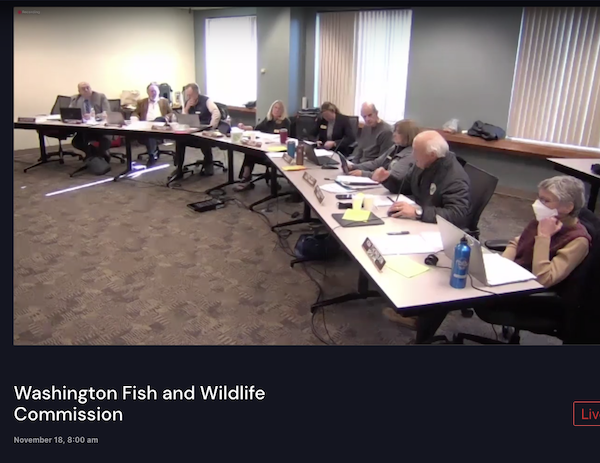
WDFW Commission Kills Spring Bear Hunt As It’s Known
The Washington Fish and Wildlife Commission this afternoon killed the state’s spring bear hunting season as we’ve known it, on the now usual 5-4 margin.

The vote came after about four hours of debate through a special “structured decision making” process and follows a rocky two years for the limited-entry permit hunt that’s been around since the early 1970s to reduce timber damage, mitigate deer fawn and elk calf predation, provide a big game hunting opportunity early in the year and address human-bear conflict problems.
Commissioner Tim Ragen of Anacortes made a motion that the commission “does not approve a recreational hunt of black bears in the spring,” seconded by Commissioner Lorna Smith of Port Townsend, and subsequently amended at Commissioner Melanie Rowland’s suggestion to “does not approve recreational hunting of black bears in the spring.”
The trio plus Chair Barbara Baker of Olympia and Commissioner John Lehmkuhl of Wenatchee voted in favor.
“I think harvesting animals during the reproductive period does not make sense.”
–Tim Ragen, Washington Fish and Wildlife Commission member
Voting against it was Vice Chair Molly Linville of rural Douglas County and Commissioners Kim Thorburn of Spokane, Jim Anderson of Buckley and Don McIsaac of rural Clark County.
The commission’s decision did appear to leave some wiggle room for WDFW managers to use a “management” hunt versus a “recreational” one in the future to address specific emerging needs, which they would need to bring to the commission – a governor-appointed citizen panel that is likely to be further affected by the expiring terms of two pro-hunting and -fishing members at the end of the year.
The last time Washingtonians hunted black bears in their state in spring was 2021, after a superior court judge cleared the way for WDFW’s lawsuit-threatened hunt to occur.
An agency press release that came out just after 5 p.m. characterized the commission’s move thusly: “The Commission moved into a discussion that integrated a workshop on spring black bear policy. Commissioners voted 5-4 to not adopt recreational black bear hunting in the spring. However, the Commission discussed support for the Department to propose hunts that would utilize recreational licensed hunters when needed to address certain management objectives, such as timber damage, achieving ungulate management objectives, or human-wildlife conflict issues and expressed that this was not precluded by the motion.”
Where once all hunters could put in for a spring bear tag, accruing enough points after a few years to stand a reasonable chance of being drawn, now they will need to … ?
There’s little solace for sportsmen now more suspicious than ever about a Fish and Wildlife Commission yawing sharply to port.
“The Washington Chapter of Backcountry Hunters & Anglers is disappointed in the Commission decision, not only in the outcome, but in the continued use of problematic language and statements that has persisted throughout this two-year ordeal,” said the organization’s secretary Dan Wilson this afternoon. “Once again, Commissioners have interjected their personal biases onto a government oversight panel that is answerable to the citizens of Washington, including rural counties, indigenous communities, hunting stakeholders, private industry and department funding channels. We are deeply concerned with the proceedings; notably commissioners communicating with external parties during the closed session, usurping the concept of fair chase, and even attacking the core model of when and how game is ethically and legally pursued through North America.”
Disappointment was also the reaction for Marie Neumiller, executive director of the venerable Spokane-based Inland Northwest Wildlife Council.
“I’m disappointed that the commission once again made a major decision without proper public involvement or notice. The public was notice stated that they would be holding a workshop to discuss how they would go about making policy. At no time did they disclose that the planned on ending the season completely.”
In the leadup to making his motion, Ragen – the former executive director of the Marine Mammal Commission – said over recent decades the country has been “embracing more and more rigorous measures in the way we protect our environment,” and yet there had “been so many mistakes in our country over assuming we know what’s going on with wildlife populations and then watching them crash.” He touched on the loss of species and few recoveries of endangered or threatened species – there have been plenty of success stories for hunted ones – and said a good job wasn’t being done.
(A subplot during today’s meeting and noted in the aforementioned WDFW press release was the signing of a letter expressing support for the Recovering America’s Wildlife Act, or RAWA, in Congress. Should it pass the Senate, it would yield millions for the state agency and others and tribal managers across the country to manage underfunded nongame and even game species.)
Ragen said this was about “holding ourselves to a higher standards” and said the “science needs to be better.” He said the public is “changing and they are becoming more sympathetic to the needs and conservation of wildlife and that they are starting to understand the concept of ecosystem,” a cascading series of interactions that he doesn’t believe is well understood.
In regards to Washington’s robust black bear population that has somehow withstood decades and decades of hunting, spring and fall, Ragen said that hunting during the bruin rut was antithetical to him.
“I think harvesting animals during the reproductive period does not make sense,” Ragen said.
Chew on that one for a good long while, fellow deer hunters. Also, elk hunters, salmon anglers, steelheaders, turkey hunters, bighorn hunters, bass anglers.

Ragen expressed an ethical concern about the length of bear seasons, which for the vast majority of the state is August 1-November 15 and – well – has been in recent years mid-April to mid-June for 660 or so tagholders licensed to hunt select game management units in the state’s southeast and northeast corners, in the North Cascades, Kitsap Peninsula and Southwest Washington.
Lehmkuhl argued the motion didn’t stop the spring bear hunt, it just stopped the recreational purpose of the hunt. He said WDFW staff could still come to the commission if management needs need to be met. He referred them to a couple pages in the game management plan centered on predator management actions.
He said he didn’t object to using “sport hunters or recreational hunters” to meet management objectives, an option he prefered to USDA Wildlife Services coming in and taking out a problem animal and “dumping it in a hole,” or landowners hiring professionals to do the job.
At the same time he had a beef with the word “recreational” around the hunt, which he equated with “doing it for fun.”
In fact, the term appears to harken back to a type of license that the state legislature has authorized the Washington Department of Fish and Wildlife to sell; the other is a commercial license.
And Lehmkuhl again asked his questions around why only bears are hunted in spring.
‘Why not elk? If we could answer that, it would satisfy me.”
The truth is, it probably wouldn’t.
McIsaac, a deer hunter, felt that the motion on the table this afternoon represented a new policy for the commission and it needed to be reviewed by the public as it was also the first time the citizen panel was seeing it. If there was to be no more recreational hunting of black bears, he wondered if a SEPA review for impacts to ungulate neonates, timber and humans might need to be performed.
He said it didn’t compute with WDFW’s directive from state lawmakers.
“Going to zero is not in the mandate of this commission,” he said.
And he also questioned Ragen’s contention that game shouldn’t be hunted during its reproductive cycle.
“That rationale could be applied to cougars, for sure no blacktail deer hunting,” McIsaac said.
Anderson felt that Ragen’s requests for more science were overboard. He said scientists like Ragen might need it, but the commission and WDFW had been “operating successfully for many years” with the systems that have been in place.
Over and over the issue of public trust in wildlife management was brought up. WDFW and the commission have been targeted by groups wanting to reform it, pushing polls out and claiming they were out of touch. For Thorburn it felt a little like she was being “blackmailed.”
“‘We only trust you if you ban another group’s cultural practices,'” she mimicked.
In the end today will go down as a fell day for Washington hunting.
“While acknowledging the low trust currently held by the commission, their decision and statements have only further eroded the trust placed in them by the hunting community,” added Wilson, Washington BHA’s chapter secretary. “By arriving at a policy before performing a SEPA review, they have diminished the very values of environmental responsibility they claim to advance. Washington wildlife and recreational opportunities face more significant challenges than just those related to spring black bear management. While we want the commission to move forward with this important work, we are also not content to concede a responsible, ethical and culturally important opportunity simply because they claim to be tired of addressing it.”
And Neumiller raised a curious moment in which Commissioner Rowland – appearing by Zoom link because she was reported as sick – apparently took “comment from members of the public during a meeting that was marked as being closed to the public.”
“That is far from equal/fair access,” Neumiller said.

